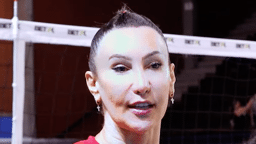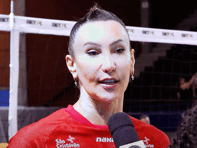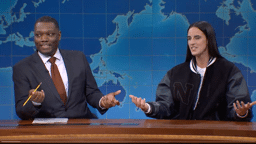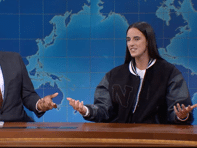Martina Navratilova was recently named by the AARP as their Health & Fitness Ambassador to their 39 million members. Starting in 2008, AARP members will be able to access health and fitness tips, exercise routines and other features via AARPfitness.com. We caught up with Navratilova on the set of Good Morning America as she was taping a segment in early December.
Outsports: How did your relationship with the AARP come about?
Navratilova: They contacted me about doing an event a year ago, and I guess they liked what I brought to the table, so they wanted to expand the relationship.
 |
| Navratilova shows Robin Roberts her favorite salad recipe on Good Morning America. |
There’s certainly a stereotype that seniors don’t go on the Internet. Is the Web the best place for this?
Absolutely. My mother, who is 74 years old, last year learned how to use the computer. She ordered Christmas presents online this year and had them delivered to her house because she can’t go shopping anymore. So I think seniors are much savvier than we give them credit for. And of course, the biggest influx of AARP members are the baby-boomers, who are tech-savvy. I’m into all the gadgets. For the most part, AARP is redefining what life after 50 is all about; it’s about staying active, not just physically active but also mentally active. And one way to do that is to experience computers.
Of the descriptors of you, where would you rank 50-year-old with these descriptors of you: athlete, lesbian, woman, American.
I’ve never defined myself by my age. For me, it’s about being a humanitarian more than anything else right now. If you put them in line, probably woman first, tennis-player, humanitarian, then either lesbian or 50-year-old. I don’t like to put it in an order of importance because they all make the sum of the whole. It’s like when people ask me what was my favorite win or who’s my favorite player. It’s not that. Maybe I can give you a top 10, but not in any order. Being 50 is a badge of honor, that I was able to do what I was doing at this age, which hadn’t been done before.
The way you’re looked at by society is athlete first. But most of the rest of the well-known openly gay athletes are known as gay first and athlete second. Why do you think society looks at you differently, as an athlete first before you’re gay?
I’m a woman first, because that’s been more limiting in a way, and it still is, depending on what country you’re born in. I want the fact that I’m gay to be irrelevant one day. It’s relevant now because we don’t have equal rights and we are discriminated against. One day they won’t even say gay, but right now it is part of leading the way and being a pioneer and leading the fight for equal rights for all of us. It might be because I became famous first as a tennis player and then I came out. But then it was still always “lesbian tennis player.”
A lot of the others had limited recognition by the public at large before they came out.
A lot of people became more famous because they were gay than for their athletic accomplishments, and my athletic accomplishments made me famous.
There are a lot of screamers out there when you look at equal rights movements, whether it’s for women or seniors or gay people. You have always been a very careful, thoughtful voice. Where did that come from? Why have you never become a screamer?
There are many societies, Thailand for one, where if you start screaming people think you lost your mind. Perhaps it’s because I don’t like to be screamed at, I just shut down and don’t listen. I try to be straightforward and say exactly what I think, and I try to do it in a nice manner. Maybe it’s because I don’t feel it’s anything we need to scream about; we just need to get our point across. I think people are much more willing to listen when you don’t scream. People really tune into you when you start speaking quieter, and hopefully you have something interesting to stay.
There are more and more out lesbians on the tour, but we still have never had an openly gay man in tennis. Why do you think that is?
I have no idea. I don’t personally know any who are gay, because none have come out to me.
Really? That seems crazy.
Honest to God. I have suspicions, but I don’t know of one who’s definitely gay. I read that letter to Tennis magazine [in 1994] from an anonymous male player who said “thank you because we’re not all as brave as you are,” but I don’t know who they are. But I don’t know why. It can’t be because they’re all worried about endorsements, because most of them don’t get any anyway. And now, perhaps they’d get one because they are gay. It’s funny. I understand it in team sports because it can become a negative if the coach or the front office is homophobic and you might not get to play; let alone that your opponents might come after you. But in tennis, nobody can stop you from playing because of your sexuality or if someone doesn’t like you. If your ranking is good enough, you get to play. It’s very simple. So I don’t know why none have come out.
It’s fascinating that none of them have approached you.
There were women I didn’t know were gay that I found out after. I would get a vibe from some players when I was playing. The ones who were very certain of their sexuality, one way or the other, were more friendly. And the ones who were less certain or were homophobic were not so nice. Or they were afraid that people would think they were gay because they were my friends. It’s kind of funny. Pam Shriver wrote a book about her life, where she was proclaiming her heterosexuality, and she is straight, because everybody thought that because she played doubles with me she must be gay. There was a Russian player who wanted to play with me but her father wouldn’t let her play with me because I’m gay. And at the time she was a nobody. He liked me, he’d say hello to me, but he would not let her play. It’s bizarre, I could have been a help to her. Now she’s off the tour because of injuries. But that’s unusual. I didn’t encounter much homophobia like that. But it is bizarre that players would be in the closet so much that I don’t even know who the guys are.
How much money in endorsement deals do you think you lost over the course of your career because you were out?
Oh gosh. I don’t know. Maybe $10 million? A lot.
How much sleep did you lose?
None. Over what? Because I wasn’t making as much money as I could have been? Money was never the reason for me to play tennis or do anything. I never schmoozed, I never went to the parties where I’d meet the movers and shakers who would get me exhibitions or endorsements. I just did my thing and focused on playing the best tennis that I could, and that certainly didn’t include going to the parties. And I was never ashamed of my sexuality. I never was, even growing up in Czechoslovakia where homosexuals were put into the insane asylum. I never thought there was anything wrong with loving another human being. I never saw anything wrong with it. A lot of people had issues with it, like
my parents, but I never lost sleep over it.
Are your parents still here?
My father died six years ago and my mother is still around. He had a bad reaction initially, but he educated himself, he read some books and talked to people. And he realized he had nothing to do with it, I had nothing to do with it, it wasn’t a negative or a positive, that’s just the way it was. He was just concerned whether I was happy or not. My mom was pretty cool about it the whole time. She was more worried about the people I was with, not what gender they were.
When are you going to open an academy?
I’m working on it. In the Czech Republic in the next couple of years. I can’t tell you when, but it’s very much in progress.
Why there?
It’s a lot easier to get it done there than here. It’s easier to get the financing, and that I’ve spent a lot of time there. It makes sense.
If you could coach one player on the men’s or women’s side, not necessarily the best player but the person you’d most like to get your hands on, who would it be?
It would have been Novak Djokovic, but he’s in good hands with Marian Vajda, and he’s bringing out the best in him. I had seen him three years ago and thought he had ‘it.’ You can spot it at any level, but certainly when you get to the top level you can start to see if they have the physical ability, and also what they have in the head, which is what keeps so many players from reaching their best. Justin Henin would have been a pleasure to work with. There’s a girl named Agnes Savay who is a great talent as well. She’s Hungarian. I saw her hit two shots and saw how she carried herself between shots and I thought, that kid is for real. When you see talent like that, that’s what you want to help mold and get the best out of them.
How much recreational drug use is there on the tour?
Not much anymore because you get busted for it. I don’t think recreational drugs should be tested for, because they’re not performance-enhancing. As athletes we should be punished for cheating, but smoking pot is not cheating. It’s not much different from drinking beer or drinking coffee. It’s mind-altering, but so is drinking coffee. I had chocolate mousse last night at dinner, and I had a couple bites and my heart started racing. I don’t know what coke does, but I imagine that’s what happens. To me, caffeine could be a drug. Sugar gets you going.
A lot of people consume caffeine before they play because it makes them more alert.
I would have a couple sips to wake me up before a match, otherwise if I had a long match I’d go into withdrawal if I had too much. Then you need to keep drinking it.
Why do you think they test for recreational drugs?
Tennis is an Olympic sport, and the Olympics has a wide range of drugs that are not allowed. But I have no idea what sport marijuana would be good for. At the top level, there’s no way you can tell me it would help. Coffee helps, it’s a performance-enhancer. I think they’ve taken it too far. My biggest problem with the drug testing is that they punish you before you’re proven guilty or not. So now with Hingis, whether it was her sample is one question, or if someone put it in her drink or her food, she tests positive and now she can’t play and she has to clear her name. She can’t compete until the case is resolved, and that could take a year.
It would be so easy to sabotage a player. I was at the Australian Open a couple years ago. Evian was the official water so everyone was carrying a bottle of Evian. I was practicing with someone, and then we sat there after practice and I picked up my bottle, or so I thought, and I was walking off the court and drinking the water and I tasted something in the drink; I had picked up somebody else’s Evian. It was probably some sugar powder, but I didn’t know what was in it and I panicked. I took it to the drug-testing people and said I just drank somebody else’s water and I asked them what I could do, and they said there’s nothing you can do. Well that was great. What I did was keep a bottle with the water and I saved it, and I took it with me for four months. So if I tested positive for anything, it was in this water, and I was preparing my defense. I drank it, but I didn’t know it was mine. But the penalty is the same, or if I took a toke of pot, or if someone took steroids and has been doing it for years. The penalty for all of that is the same, or eating a cookie laced with pot that I didn’t know about. Somebody playing a joke on Martina Hingis. She’s at a party, people are snorting coke as they do at that age, and they’re offering her some but she won’t do it because she’ll be drug tested, she goes to the bathroom, they sprinkle a little in her drink, she’d never know she took it. It’s very much a possibility, talk about a reasonable doubt. That could have happened, but now she’s screwed.
I was at a friend’s house recently. He was smoking pot and, if I was still playing, I’d be worried and I’d have to leave the room or he’d have to go outside to smoke it. I played a tournament in Holland a few years ago and smoking pot there is legal. I went into a juice bar, I wanted to do my favorite carrot-apple-ginger-lemon juice, but then I saw people smoking pot and I had to get out of there. I don’t know how little it would take, because the next week was Wimbledon. It’s that scary for us. When I quit playing, it was a relief that I didn’t have to worry about that. I never took a drug in my life.
Of course, there were steroid accusations. And that’s interesting. The steroid allegations are always with the women. Oh look at Serena, she must be taking steroids. Steffi Graf, oh look at her legs she must be taking steroid. Arantxa, look at her quads, she must be taking steroids. Martina’s arms, she must be taking steroids. Did they ever say that about Pete Sampras or Roger Federer or Nadal? Not one word about the guys. It’s always the women. It drives me crazy. And I don’t think anyone did do steroids. I know I didn’t.
Years ago you said that if you had a child you’d like it to be with Wayne Gretzky’s sperm. If you had to choose someone today, would you still pick Gretzky?
Absolutely. Why not! But I’m past menopause now. I could adopt. I always thought I would have one of my own, but that’s not in the cards right now.
Every year in Aspen during the Aspen Gay Ski Week there’s a gay vs. straight hockey match. Would you every want to play in it?
Absolutely! But those guys are really good.
Is there one piece of advice you could give to a C- or D-level GLTA player to help on their second serve, without seeing them?
Sure. The second serve is about getting it in and putting as much spin on the ball as possible. With the new strings, you can put a lot more spin on the ball. That’s the key.
Do you think Federer will ever win the French or Henin will ever win Wimbledon?
Yes, both. I think Henin has a better chance, because her game is better-suited to winning Wimbledon than Roger’s is for clay. But both could win it this year, and since the French comes first, Roger would do it first. If Nadal wasn’t around he would have already won it a couple times.
We have a member at Outsports named Gaga4Gaby. Is there anything you could tell us about Sabatini that we might not know, or any personal insight?
Everybody
loves Gaby. She’s just a wonderful, good person. I couldn’t say anything bad about her. The only thing I’d say is that she quit too soon. I’m disappointed that she quit when she quit. She could have won Wimbledon. She had the game for it. But she quit before she got to that, before she could take it to another level.
Do you use your AARP card to get into the movies?
I haven’t yet because I haven’t been to the movies in so long. But I will. I’ve been talking about that for years. It’s a gift card, becoming an AARP member.
How much gayer did Karen Walker make you?
Oh, from Will & Grace? That was fun. I’d like to do more acting, I had fun doing that. I’d like to do it as somebody else, instead of playing me.
When you’re down, is there something that picks you up?
There are different things. Different people inspire me at different times. There was a moment when I was driving in Aspen, and I saw a woman with one leg on the side of the road running with crutches. And she was going along, her leg, then crutches, her leg, then crutches. And Katherine Hepburn inspired me when she told me, “You are what you finish.” You know? People start things, but they don’t finish them.
Of the thousands of interviews you’ve done, is there a question you’re surprised you’ve never been asked, or one you’d like to be asked?
No, not really. Some of the best questions come from the fans. One time on an Internet chat someone asked me, “What’s going through your head when you toss the ball up?” It was a great question. Nothing should be going through your head, but what are the thoughts? Personal questions, I don’t want to be asked those because I won’t answer them. There aren’t many skeletons in my closet, though I do still have a few of them. There’s no way I’d talk about some of the stuff I talked about 20 years ago.Discuss this interview







































